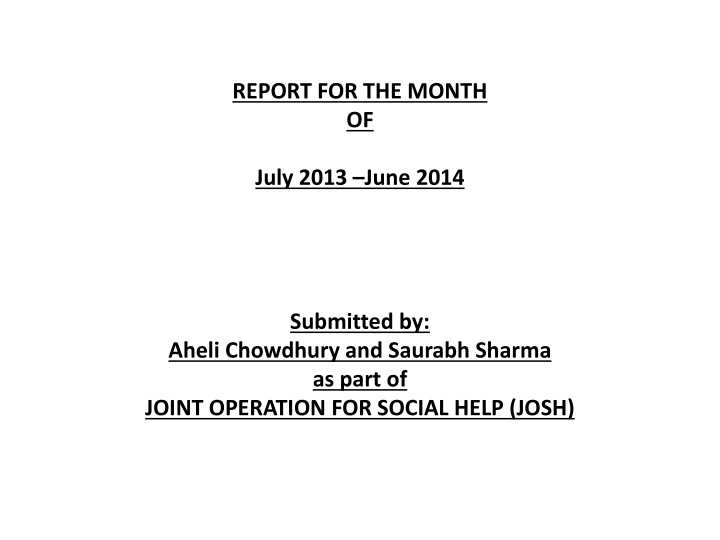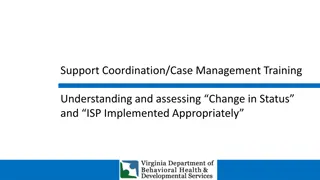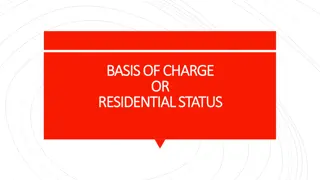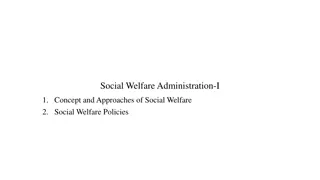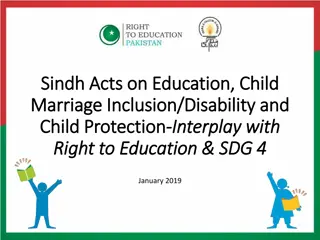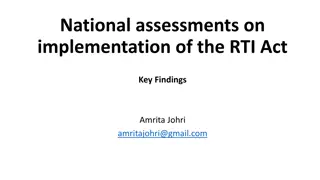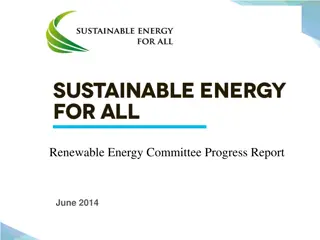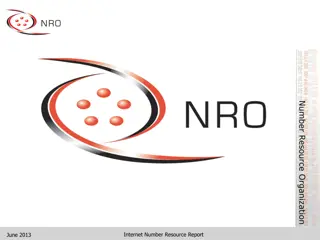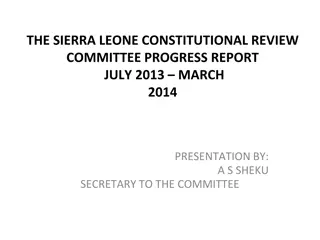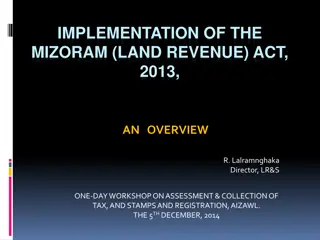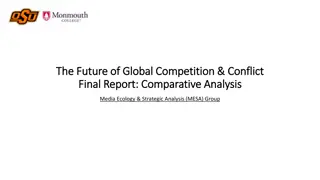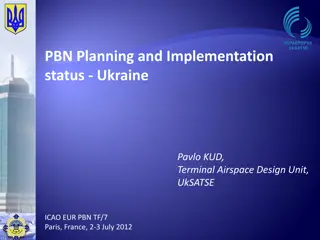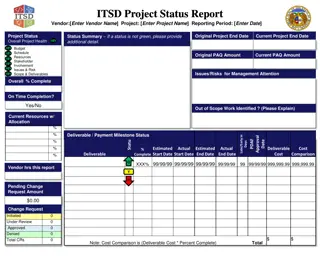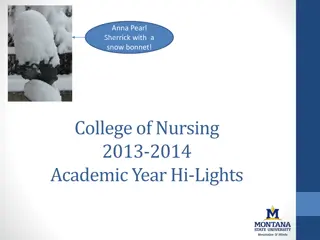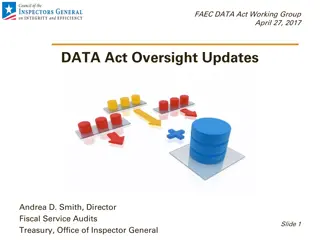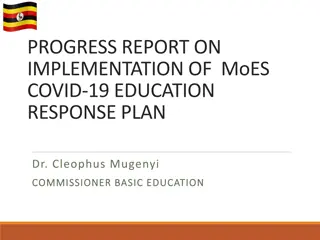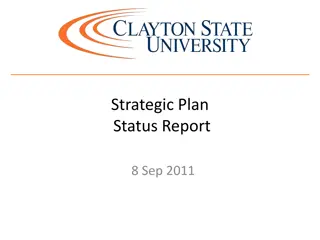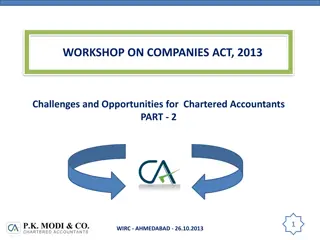Implementation of Right to Education Act: Status Report July 2013 - June 2014
Activities report for the month of July 2013 to June 2014 submitted by Aheli Chowdhury and Saurabh Sharma as part of Joint Operation for Social Help (JOSH). The report focuses on the implementation of the Right to Education Act, including advocacy efforts, school inspection processes, capacity building, and mobilization of volunteers across various districts in Delhi.
Download Presentation

Please find below an Image/Link to download the presentation.
The content on the website is provided AS IS for your information and personal use only. It may not be sold, licensed, or shared on other websites without obtaining consent from the author.If you encounter any issues during the download, it is possible that the publisher has removed the file from their server.
You are allowed to download the files provided on this website for personal or commercial use, subject to the condition that they are used lawfully. All files are the property of their respective owners.
The content on the website is provided AS IS for your information and personal use only. It may not be sold, licensed, or shared on other websites without obtaining consent from the author.
E N D
Presentation Transcript
REPORT FOR THE MONTH OF July 2013 June 2014 Submitted by: Aheli Chowdhury and Saurabh Sharma as part of JOINT OPERATION FOR SOCIAL HELP (JOSH)
Overview Fellows: Aheli Choudhary and Saurabh Sharma Since 2007-13 @ Rs 15,000; 2013-14 Rs 20,000 per month each Co-founders of JOSH (Joint Operation for Social Help) Rights based governance/development Use RTI to monitor the functioning of MCD schools Currently, focus on RTE implementation and advocacy
Activities Report of Status of Implementation of Right to Education Act (RTE Act): The Delhi Story Advocacy with Elected Representatives for better implementation of RTE Act: Vote for Education Campaign School Inspection Process Training and Capacity Building Urban Poor Youth The Minority Resource Centre
Report of Status of Implementation of RTE Act Mobilization and Induction of Volunteers Capacity Building and Training of Youth Volunteers Identification of the Area and Mapping of Households Central District: Daryaganj New Delhi District: JJ cluster North District: Timarpur North East District: Seemapuri North West District: Rithala South West District: Munirka South District: Malviya Nagar East District: Trilokpuri West District: Patel Nagar
Report of Status of Implementation of RTE Act Preparation of Questionnaire Children Parents Teachers/School Authority Other community members RTE Awareness Camp: Volunteers Reach Out to Households Conducting the Survey Compilation of the Data Report: Status of Implementation of RTE Act Getting Media coverage
SNo District Neighborhoods No of households covered No of schools covered 1 North Timarpur 200 4 2 North West Rithala: Bengali Bazar, Pal 210 3 Colony 3 South Malviya Nagar: Jagdamba 200 6 Camp, Valmiki Camp, Indira Camp 4 SouthWest Munirka: Kuli Camp, 200 3 SaraswatiCamp 5 West PatelNagar 250 6 6 Central Daryaganj: Maulana Azad 200 7 basti, Takia Kale Khan basti 7 New Delhi JJ cluster of Auranzeb 146 4 Road, BR Camp and Palika Camp 8 East Trilokpuri 217 8 9 North East Seemapuri: Sunlight 200 5 Colony Total 1823 46
Compiled Data Formation of SMC in schools in Delhi was delayed even after Delhi notified its rules, as specific orders for formation was SMC was not given Government order for formation of SMC was only issues on 23rdof March, 2013, just a week before the completion of the three year deadline of RTE Act coming to an end on the 31stof March, 2013. The survey found that all schools reported that they have received orders to form SMC and they have formed the same following due process However, community verification of this claim revealed shocking results across all the areas surveyed. 95% of parents reported that they had no knowledge of formation of SMC and that even if they may have been formed there was no election held and that SMC exists only on paper Complete absence of any form of Grievance Redressal mechanism. 80% of parents responded that they don t complain even if they have any grievance. Reason cited- no GR mechanism, insulted and humiliated previously etc
Compiled Data 84% of parents stated that they do not have any platform or space where they can raise their grievances Parents stated that lack of any formal GR mechanism affecting implementation of the RTE Act 86% of parents stated, if given a chance they would want to improve the functioning of the school 25% children still reported that there teacher asked them to get money from home- ID cards, PTA funds, exam fees etc Presence of out of school children reported in many areas. High number found in Rithala basti Quality of teaching still remains a challenge. 28% of children reported that they could not even undertake simple mathematical 26% of children reported that they could not even read simple text
Compiled Data Given the poor quality of teaching, 52% of parents send their children to private school and spend an average of Rs. 400 every month 50% of the children reported being subjected to corporal punishment and different forms abuse in the school Teachers engaged in non teaching duties-election duty, polio campaign, census duty as well as clerical work within the school 73% of schools reported had contract teachers While shortage of teachers, is still a problem, but the study indicated that teachers engaged in non teaching duties-election duty, polio campaign, census duty as well as clerical work within the school However, positive response been that 85% children also reported that they liked their teachers. Around 83% of the children reported that they understood what is taught in class With reference to the Mid Day Meal served in school, 49% of parents reported that the Mid Day Meal served in the school was of bad quality
Compiled Data 45% of parents reported that their children do not eat the MDM served in the school and many instances of stale, under-cooked food as well as presence of stones and dead insects, lizards were reported for MDM in areas of Timarpur, Malviya Nagar, Seemapuri Parents also reported complete lack of any mechanism for grievence redressal, which caused problems of raising issues of poor quality of MDM. And given the sensitiveness of this provision, it is absolute crucial that a fast track mechanism responsive to grievances is set up Schools also reported lack of control over vendors supplying MDM as it is central decided and the schools have no authority over them Even after four years of enactment of the RTE Act, provision of infrastructure still not adequate. About 43% of the students reported that there were no functional toilets in their schools 47% of the students stated that there was no clean drinking water in their schools. The majority of the students carried drinking water from their homes in a bottle
Compiled Data 25% of the students still do not have adequate desks and chairs to sit in the class. They reported that they were either made to sit on the floor, stand along the wall of their class or sit on the desk While RTE Act talks about inclusive education, only 37% of children reported that they have Children with special needs in their schools. Main reason been- denial of admission, pushed out due to lack of care and adequate infrastructure facilities 80% of the schools did not have provision made for special teachers or special training for present teachers and this also been made a reason for denial of admission
Reporting the compiled data These papers were consolidated to form status report of RTE Act in Delhi. This report was released on 27thof March, 2014 at Seminar Room No. 2, India International Centre, Lodhi Road in an event which was graced by the presence of Ms. Mamta Sahai, Member, Delhi Commission for Protection of Child Rights (DCPCR), Mr. Praveen (Country Lead, VSO India), Mr. Ambarish Rai (RTE Forum), Ms. Yamini Aiyar (Accountability Initiative), Prof. Nalini Juneja (NUEPA), Ms. Kiran Bhatty (Centre for Policy Research), and other such eminent educationists. On this occasion students of the college also made their respective presentations detailing their findings and experiences. After the report was formally released, the student volunteers presented the respective papers in front of the panel and audience and shared their findings and experience. The report was widely received by all the leading news papers that covered the findings of the report extensively.
Vote for Education Campaign Volunteers met different members of across political parties and shared with them about the status of education, especially about the poor implementation status of Right to Education Act (RTE ACT). Volunteer teams went around the city of Delhi and interacted with the people, making them aware about the RTE Act and also about the poor status of its implementation in the National capital and then urged them to vote for candidates supporting the cause of education. Media Coverage
School Inspection Process JOSH filed a complained at the Central Information Commission (CIC), the nodal appellate body under the Right to Information Act (RTI Act) under Sec 4 of the RTI Act in 2011. In response to this complaint the CIC passed a landmark order allowing inspection of all records and documents of the school by any citizen on the last working day of every month. Success stories and media coverage
Training and Capacity Building Urban Poor Youth This component of the work, reaches out to urban poor youth living in slums and resettlement colonies of Trilokpuri and Kalyanpuri, in east of Delhi Language Literacy Computer Literacy Group Discussion Is India really a secular state Democracy and governance in India Why are we hesitant to vote Discussion on the present education system of India Is volunteerism needed in our society An Indian women- a better homemaker or better businesswoman? Corruption in India Education system in India Aaina- Theater Fest 2014
The Minority Resource Centre This center was established by JOSH in 2012 in response to the multiple demands from the minority community living in the slum and resettlement colonies of Trilokpuri It was started as small initiative with no support and since then it Students of MRC during a class is been mainly run without any financial support but with the enthusiasm of the community. The main objective of this center was to create a platform for young girls, especially from the minority community to come together to creatively learn and develop their skills to able to access better career and life opportunities.
